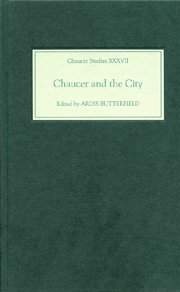Book contents
- Frontmatter
- Contents
- List of Illustrations
- Dedication
- Preface
- List of Contributors
- Abbreviations
- Map
- INTRODUCTION
- LOCATIONS
- COMMUNITIES
- INSTITUTIONS
- 8 Literary Contests and London Records in the Canterbury Tales
- 9 The Great Household in the City: The Shipman's Tale
- 10 London and Money: Chaucer's Complaint to his Purse
- AFTERLIVES
- Bibliography
- Index
- CHAUCER STUDIES
8 - Literary Contests and London Records in the Canterbury Tales
from INSTITUTIONS
Published online by Cambridge University Press: 05 February 2013
- Frontmatter
- Contents
- List of Illustrations
- Dedication
- Preface
- List of Contributors
- Abbreviations
- Map
- INTRODUCTION
- LOCATIONS
- COMMUNITIES
- INSTITUTIONS
- 8 Literary Contests and London Records in the Canterbury Tales
- 9 The Great Household in the City: The Shipman's Tale
- 10 London and Money: Chaucer's Complaint to his Purse
- AFTERLIVES
- Bibliography
- Index
- CHAUCER STUDIES
Summary
Perhaps no English poet has been better situated than Chaucer to describe the institutional workings of London. His family was prominent in the commercial life that was central to the city, and he himself, even when under royal patronage, held a number of jobs that involved him closely with municipal affairs and the powerful international merchants who controlled the economic and political life of London. As controller of customs in the port of London, Chaucer worked under such magnates as Nicholas Brembre, John Philpot, and William Walworth, all of whom served as aldermen and mayors of the city. The wealthy Philpot, who financed a private navy to defeat pirates attacking English shipping, was close enough to Chaucer to be a witness to his release from the charge of raptus against Cecilia Chaumpainge. At the end of Troilus and Criseyde the poet appeals for correction to Ralph Strode, who was the common sergeant of London, the city's attorney. Despite his many connections to those who ran the metropolis, Chaucer avoids direct reference to the subject of London in his early poetry, and it is not prominent in the Canterbury Tales: the pilgrimage originates outside the city walls and contains only two tales set in London: the unfinished Cook's Tale and the second part of the Canon's Yeoman's Tale. The London we see in each is not the aristocratic and mercantile world we might expect because it was so well known to Chaucer, but rather an underworld of immorality, fraud, misrule, and other threats to decency and the good order of the city.
- Type
- Chapter
- Information
- Chaucer and the City , pp. 129 - 144Publisher: Boydell & BrewerPrint publication year: 2006

